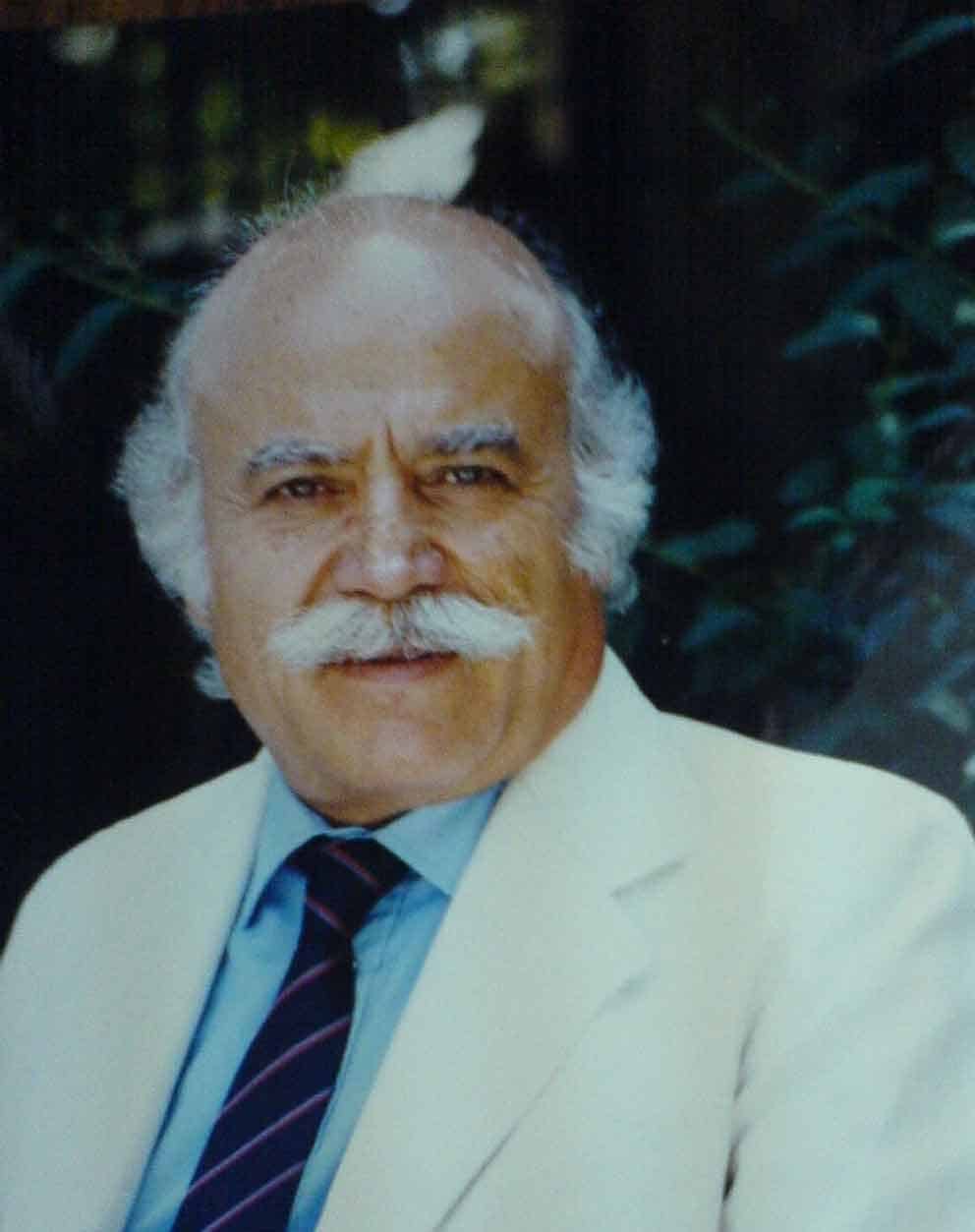Davoud Pirnia, writer and musicologist was the founder of “Golha” (Flowers of Persian Song and Music) programs on Tehran Radio (1956-1966). He received his early education from his father, Hassan Pirnia (Moshir al-Douleh), and several tutors of the time (Taraghi, interview, July 1989) and continued his studies at Saint Louis School in Tehran and then in Switzerland and graduated in law. While studying law, Pirnia got acquainted with European classical music. Upon returning to Iran, he was employed by the Ministry of Justice and founded the Lawyers’ Guild. Then he was transferred to the Ministry of Finance and established the Department of Statistics in this ministry. Later, he became the head of the state inspection office at the Prime Ministry; he was, then, promoted to the position of the Deputy Prime Minister (Navab Safa, interview, August 1999)
Tag Archives: Golha
From the Last Instrumentalist to the First Composer (II)
Rouhollah Khaleghi was the master of composing beautiful melodies. He was the premier of the course of history which was first established by Ali Naghi Vaziri and which improved the Iranian music from simply a gathering music to the classical music of the country. First efforts to compose independent and instrumental music can be also traced in Khaleghi’s works.
From the Last Instrumentalist to the First Composer (I)
Music as an art has its own special history; emergence of a singer, of an instrumentalist and then the emergence of the strong character of a composer covers three significant phases of the art of music. With the emergence of composer which was simultaneous with the emergence of the language of music, this art managed to offer a domain for criticism for its composer; a procedure which led to a magnificent variety and evolution in musical production. Even though the conflicts between singers and instrumentalists have not met their end in the Iranian society and while singers can achieve high, instrumentalists have yet to play behind curtains . In a special era, with the efforts of musicians such as Ali Naghi Vaziri (1887-1979) and Rouhollah Khaleghi (1906-1965), glimmers of a composing era started to glow bearing fruit in Khaleghi’s achievement as Iran’s first professional composer. Khaleghi made his reputation as a composer while Vaziri deserved to pioneer this path. By then Vaziri was well-known as a Tar player.
Latest posts
- Transition to Enlightenment: Six Lectures on Mozart’s String Quartets (5)
- Nasser Masoudi: The Voice of Gilan and a Legacy of Iranian Music
- Farhad Poupel: The Voice of the Shahnameh in the Orchestras Around the World
- Five Major Myths About Mozart’s Life
- Bahma Rajabi Passed Away!
- Reza Vohdani; Unveiling unpublished works, preservation of Iranian classical music
- Ahmad Pejman Passed Away!
- Timeless or Timely: The Role of Historical Context in Defining Artistic Value
- Leading the Charge in Censorship
- The Legacy of Khosrow Jafarzadeh
- Transition to Enlightenment: Six Lectures on Mozart’s String Quartets (4)
- Fereydoun Shahbazian, An Iranian Musical Icon Passed Away
From Past Days…

Homayoun Rahimian & Iran’s National Orchestra
The Roudaki Foundation presented the permanent conductor of the National Orchestra (Orchestr Melli), Homayoun Rahimian, in a ceremony, and finally, after four years, the national orchestra found a permanent conductor. Homayoun Rahimian is the fourth permanent conductor of this orchestra after Farhad Fakhreddini, Bardia Kiaras, and Fereidoun Shahbaziyan. He, who has previously had experience of conducting concerts besides being Meister’s concert of this orchestra, performed the concert “Autumns” on the 20th of Tir, performing works by Rouhollah Khaleqi, Javad Ma’roufi, and Hossein Dehlavi.

A Look at Ali Tajvidi’s Manifold Musical Activities (II)
Tajvidi thought of studying harmony and orchestration with Houshang Ostvar (who was eight years younger than him) at a time when he had gained a reputation among musicians. His humbleness, making him willing to kneel before the scholars at any age and position, became the key to his scientific success. After this period, Tajvidi made some of his works polyphonic, the most prominent of which is “Burn” set to a poem by Abdullah Ulfat. However, his ability to make his works polyphonic was not so great to make him self-sufficient; so he depended on musicians such as Farhad Fakhreddini, Fereydoun Naseri, Kambiz Roshanravan, Fereydoun Shahbazian and Morteza Hananeh for the arrangement of his compositions.

Reza Vohdani; Unveiling unpublished works, preservation of Iranian classical music
Reza Vohdani is a renowned name among tar (traditional Iranian instrument) players, especially within the Iranian music community that values the meticulous practice and teaching of traditional music. While Vohdani honed his skills in music theory and tar playing under the guidance of masters like Ali-Naghi Vaziri, Ali-Akbar Shahnazi, Hossein Dehlavi, and Ahmad Forutan-Rad, it is his unwavering dedication to studying, documenting, and teaching the Iranian classical music repertoire that has solidified his prominence in the field. Recently, Vohdani’s family decided to make his preserved works accessible to the wider art and music community. In this regard, The Persian-language newspaper ‘Iran’ spoke with Sadjad Pourghanad, a musician, university instructor, and music researcher, who shared his opinion into the project, as detailed in the interview below.

The 4th Iranian Festival of Music Websites and Weblogs
The 4th Iranian Festival of Music Websites and Weblogs was held in Niavaran Cultural Center, in Tehran, Iran on Feb. 28th, 2015. The initiator of the festival was Sajjad Pourghanad, Iranian music writer, researcher, founder of the festival and Persian setar and tar player.

Women and the Music Environment in Iran
The life territory of the female-male relations in the Iranian cultural context is basically a domestic territory and not a social-living one in the labour and leisure domains. To prove this, it only suffices to consider the Iranian men’s viewpoints about women. For the Iranian men, there are three perspectives regarding the women: mother, sister and wife. Mother represents the emotional territory; sister represents the logical territory at home while wife represents the sexual territory.

Timeless or Timely: The Role of Historical Context in Defining Artistic Value
Imagine that, in the course of historical research, we discover a musical piece whose compositional techniques (including form, melody, texture, and orchestration) resemble those of a second-rate 19th-century composition. But further investigation reveals that this work predates that period by 200 years. Can we still deem it insignificant? Certainly not. Here, the first major role of historical judgment becomes evident.

The Structure of Kurdistan Daf (VI)
Researcher: Mohammad Tarighat Translator: Fatemeh Alimohammadi Hooks and attached rings: The junction of the ring to the arch is about 3 centimeters from the skin. The ring with its side rings should be as far as the diameter of a ring (about one and a half to one and eight centimeters) to make a proper…
Read More

The Structure of Kurdistan Daf (II)
With its simple physical structure and captivating sound, the Daf never belonged to a particular culture or location, and every nation had different usages for this instrument considering their dominant customs and traditions.

Musical Sense or Technique?
One of the most popular terms used by Iranian instrumentalists is the existence or a lack of musical “sense”. Both musicians and fans of music consider having “sense” while playing music as an important principle to the extent that they use it vis-a-vis having technique.

Polyphony in Iranian Music (III)
In heterophonic variant, two performers perform a single melody simultaneously and change it. Performing and changing a single melody simultaneously by two performers leads to the coincidence of different voices.